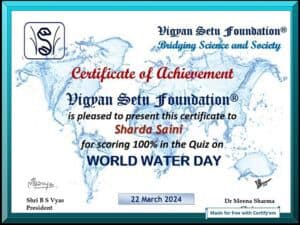
Organizer : Vigyan Setu Foundation Bridging Science & Society
World Water Day, held on 22 March every year since 1993, is an annual United Nations Observance focusing on the importance of freshwater.
World Water Day celebrates water and raises awareness of the 2.2 billion people living without access to safe water. It is about taking action to tackle the global water crisis. A core focus of World Water Day is to support the achievement of Sustainable Development Goal 6: water and sanitation for all by 2030.
About the Quiz
- Start Date : 22 March 2024
- Theme for World Water Day. In 2024, the theme is Leveraging Water for Peace.
- Free Participants
- Those scoring seventy percent or more will receive an e-Certificate.
Apply Link
website vigyansetufoundation.in
100% Correct Answers Available Here
Which one is true?
*
1/1
Hot water freezes faster than that of cold water
Cold water freezes faster than that of hot water
Precipitation may ________ into groundwater
*
1/1
Leak
Fall
Infiltrate
Flow
Which of the following element is added with water to purify it?
*
1/1
Hydrogen
Chlorine
Carbon
Nitrogen
Why can the depth of a water table be high in some places and low in others?
*
1/1
There is too much leaking occurring in certain spots
The depth changes due to precipitation, drought, or overuse of wells
Sedimentation occurs
All of the above
Roughly 44% of all the freshwater is used by ____
*
1/1
Humans
Recreational activities
Industry
Animals
Potable water is __
*
1/1
Rain water
Pond water
Sea water
Pure water that is fit for drinking
Which of the following are soluble impurities?
*
1/1
Soaps
Dirt
Oil
Clay
What is desalination?
*
1/1
The process by which salts are removed from the water
When water is heated to boiling so water evaporated but salt remains; water vapor is cooled and fresh water collected
Removing water vapor from local areas
None of the above
Where is most of the Earth’s freshwater located?
*
1/1
In icecaps and glaciers
In oceans
In storage tanks
In lakes
How is Earth’s water supply being continuously renewed?
*
1/1
Through photosynthesis
Through the water cycle
Through oceans
Through global warming
